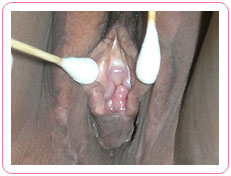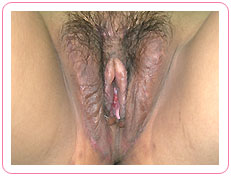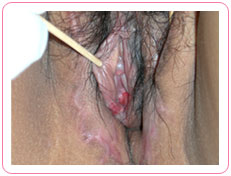The development of bcs SRS technique
This is the legend of the SRS . SRS is a sophisticated and specialized plastic surgery procedure. Even the limited tissue available, the operation is still developed . in the beginning the aim of the operation is just to make an adequate depth and width of neovagina but now aday more people concern about the aesthetic appearance of outer and inner vagina. Therefore, to develop the better result, the surgeon need to recognize the tecnique of tissue transfer especially flap-graft dissection and setting.
The 1st edition
The 1st edition to the 3rd edition , we started from the year 1999 to 2004 the technic is quite simple but very safe in flap survival.
In the 1st edition ,the critoris is still flat and the critoral collumn is very wide, it is the time to put in the graft from the scrotum to neovagina . the hood of critoris was set by the old technique the labia minor is not securly fixed. After 2 or 3 monthes the hood and groove of labia was not well defined. The labia is short and thick to maxumize the flap survival.
The spongy tissue was reduced but after long term followup a large mass still remained. Inside the vagina contain a small piece of graft . Almost all consisted of penile and scrotal flap.any way the distal of flap usuallt slough out and caused inadequate depth.

The 2nd edition
In the 2nd edition we taper the flap of critoris to be smaller. The result of the hood better but in some cases, the fixation is loosen. We still had the problem of circulation to critoris and labia, so in the case of longer labia , some tissue slough and the end result is not a well defined labia.

The 3rd technique
In the 3rd edition the long posterior flap (from scrotum) was created to make a longer vaginal depth.During this time because of improper cauterization machine, improper cauterization needle make the poor circulation we cannot make a long flap. After that we required verolap machine and tungstein-coated needle. During this time we did not use the new concept of packing and flap dissection, so more flap survival make the better depth and width.

